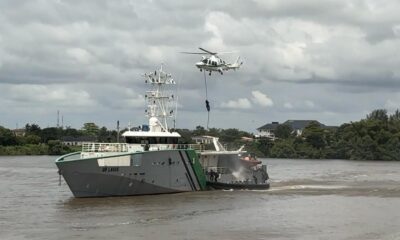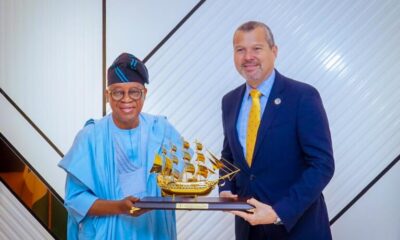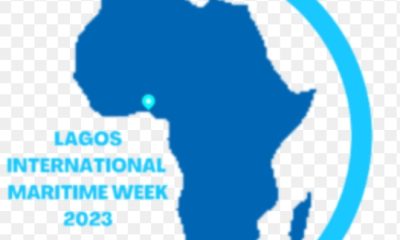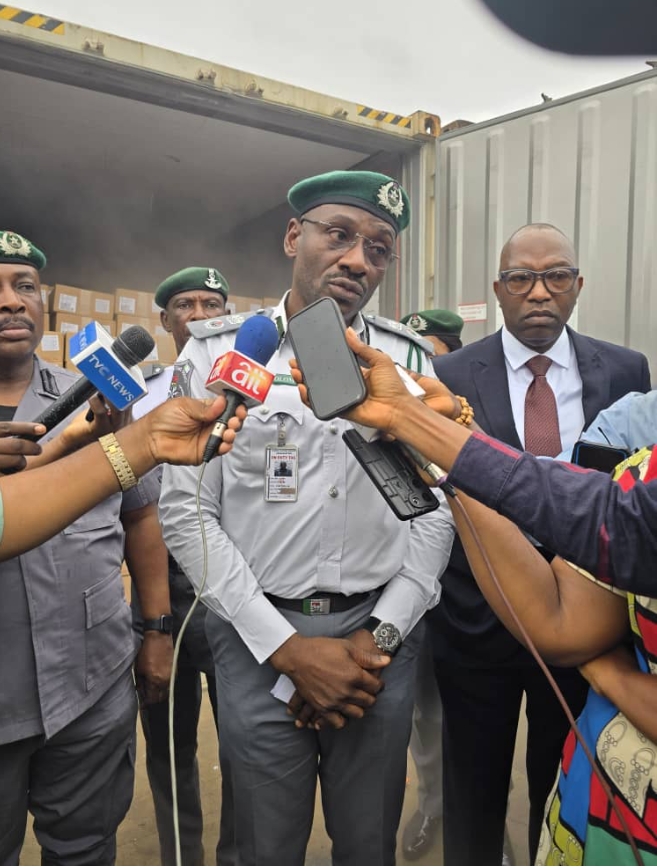Maritime Agencies
PORT STATE CONTROL: Equatorial Guinea Joins Abuja MoU
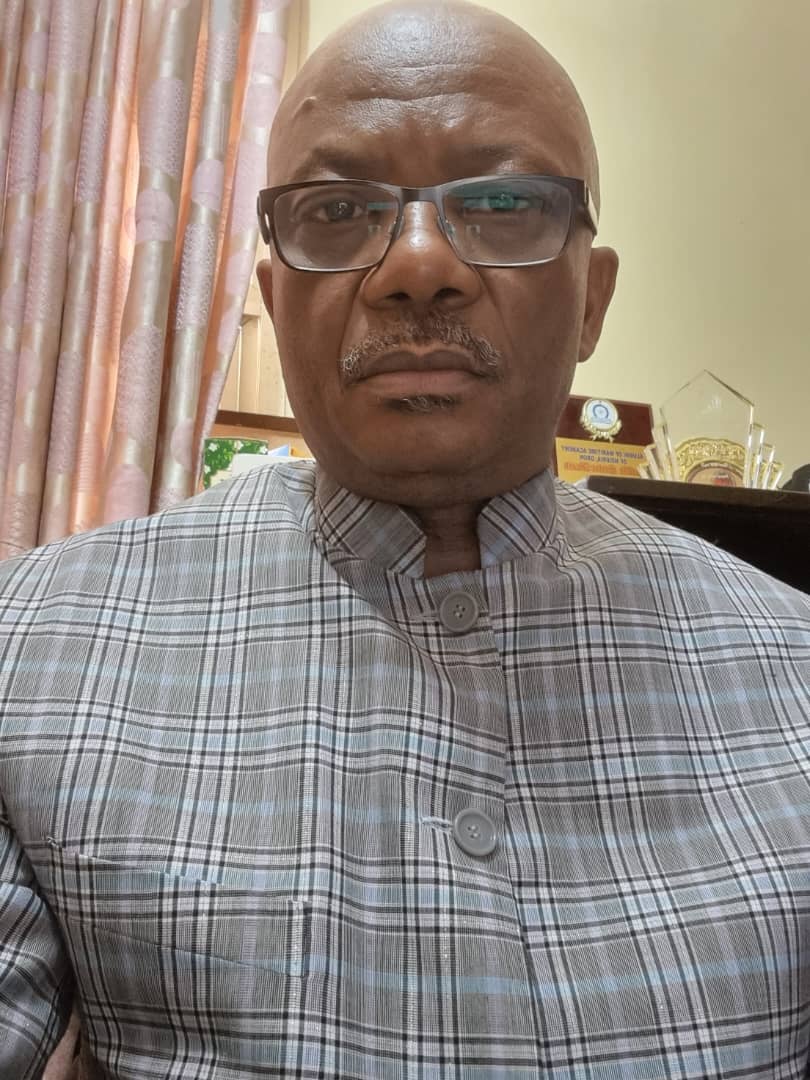
By Izuchukwu Ozoemena
November 23, 2023, Equatorial Guinea finally became a member of the Abuja Memorandum of Understanding on Port State Control in West and Central Africa, otherwise known as the Abuja MoU.
This makes the central African nation the 20th member-state of the group.
Secretary-General of the Abuja MoU, Capt Sunday Umoren disclosed this in Lagos while exchanging views with Falcon Watch Online.
“It means we have two countries in the region left now for all the countries to subscribe as full members. The outstanding countries are the Arab Republic of Mauritania and the Republic of Namibia. These are the countries that are yet to sign up,” the Abuja MoU boss said.
At the occasion, Capt Umoren explained, the Vice President and Minister of Transportation of Equatorial Guinea were present as witnesses.
“Also present were Nigeria’s Ambassador to Equatorial Guinea, the South African Ambassador and the Cameroonian Ambassador to Equatorial Guinea. They were in attendance to celebrate a wonderful day, a great celebration for Equatorial Guinea.”
On the significance of Equatorial Guinea joining the Abuja MoU, Capt who referred to it as a great day said it will be celebrated by the International Maritime Organization (IMO), other MoUs worldwide and the maritime world because with the addition, there is an increase in the number of countries whose ports are now part of the watch dog regarding the propagation and insistence on safety in navigation.
“The port state regime is actually a safety net such that no substandard ships can trade within the regions and around the world”.
“If in a region you have countries that are not full members or not acceding to become full members, it means those countries will not be conducting port state inspection of ships. Substandard ships can easily visit those ports and come out. What does that mean? It means a weak link.”
He stated that substandard ships trading could actually get involved in accidents and spillage and if they are carrying oil, the marine environment will be polluted.
“So, coming into the Abuja MoU means that we are tightening the noose around the region.”
He was optimistic that by the time the remaining two countries join, it means all countries in the West and Central African region have agreed and signed to monitor their waters and their countries to ensure that no substandard vessels are sailing within the system.
“So, everyone will be happy because the probability of substandard vessels slipping through will almost be nill. This means safer seas, safer world for all.”
He said his organization is still engaging the few countries left in the region.
“We are engaging them. We’re quite hopeful that by next year, we will have all the countries in the region subscribe and acceed to full membership of Abuja MoU.”
Port State Control is the inspection carried out on visiting foreign ships to verify their compliance with international instruments on safety, pollution prevention and seafarers’ working and living conditions. It is a means of enforcing compliance in cases where the owner and flag state have failed in their responsibility to implement or ensure compliance.
The Port State can require deficiencies to be put right and detain the ship for this purpose if necessary. It is therefore also a Port State’s defense against visiting substandard ships.
The Secretariat is established to develop a system of harmonized Port State Control Inspection Procedures for the region with the aim of eliminating substandard ships. In pursuit of a strategic direction and with consistent alignment with the context of the organization through a risk-based approach, the Abuja MoU Secretariat is committed to continuous improvement of its quality management system in line with the International Organization for Standardization requirements (ISO 9001:2015) and the IMO Resolution A.686 (17), 1991.
The Memorandum of Understanding on Port State Control for West and Central African Region, generally referred to as the Abuja MoU, is one of the nine regional MoUs established pursuant to the International Maritime Organization (IMO) Resolution A. 682 (17) of 1991. The Organization operates under a cooperative agreement with the IMO.
The Abuja MoU was established in Abuja, Nigeria, on October 22, 1999 as an inter-governmental organization comprising the Maritime Administrations of countries abutting the South Atlantic coast of Africa.
The regime covers 22 countries from Mauritania to South Africa.16 of these countries signed the MoU to establish the organization.
Countries that have completed the procedures and have become full members are Angola, Benin, Cameroon, Cape Verde, Congo Brazil, Cote D’Ivoire and Democratic Republic of Congo. Others are Gabon, The Gambia, Ghana, Guinea Bissau, Guinea- Conakry, Liberia and Nigeria.
Others are Sao Tome & Principe, Senegal, Sierra Leone, South Africa and Togo.
Maritime Agencies
We’re Ever Proactive In Intercepting Prohibited, Falsely Declared Goods, says Controller Onyeka.
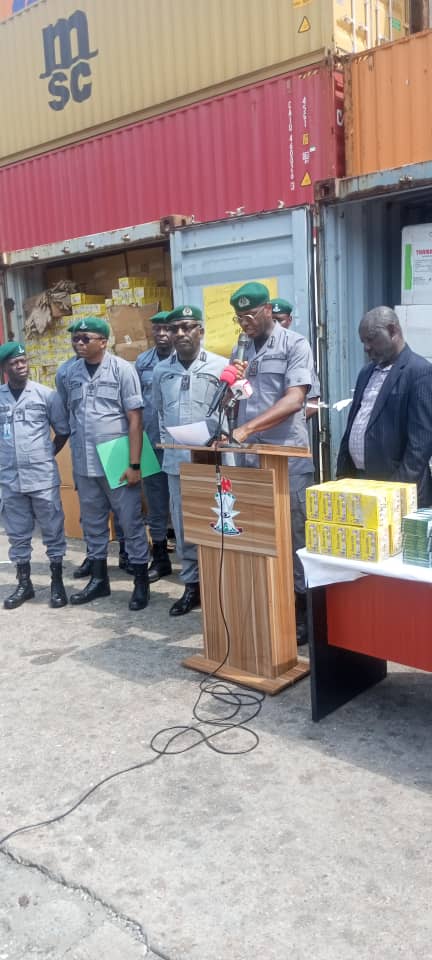
By Izuchukwu Ozoemena
In line with the core mandate of the Nigeria Customs Service, the Tincan Island Port Command is ever proactive in intercepting prohibited and falsely declared goods even as it remains committed to facilitate legitimate trade while contributing significantly to revenue generation.
The falsely declared goods include controlled pharmaceuticals, arms and ammunition, narcotics and other items capable of undermining public safety, security and stability.
The Customs Area Controller (CAC), Comptroller Frank Onyeka stated this in Lagos, Friday, while formally handing over three (3) units of 20 ft containers containing expired pharmaceutical products to the National Food and Drug Administration and Control (NAFDAC) for appropriate regulatory action.

”The containers include two units with numbers PONU031958/6 and MSKU 711656/0 which were found to contain expired Tramadol tablets,” Onyeka announced.
”These consignments were thoroughly examined and the result revealed that the first container contained 86 cartons of Vingil Tramadol BP 50 mg while the second container held 250 cartons of the same expired Tramadol product”.
”The third container with number MSKU413519/1 was found to contain 370 cartons of expired Declofenac Sodium BP 50 mg tablets without a valid NAFDAC registration number, making the consignment illegal and dangerous for public use.”
Beyond these seizures, he explained, the Tincan Command has continued to record notable achievements in recent times through intensified cargo examination, improved intelligence gathering and sustained enforcement operations. These achievements are the result of deliberate strategies anchored on discipline, integrity and strong inter -agency collaboration.
He showed special appreciation to the operatives of NAFDAC for their consistent cooperation.
”Our synergy has continued to yield positive results particularly in ensuring that fake, substandard and expired drugs are intercepted before reaching the Nigerian populace.”
He equally commended officers and men of the Command for being resilient and committed to duty, a development that has continued to strengthen the credibility and operational effectiveness of the Command.
”Furthermore, I express our sincere appreciation to the Comptroller-General of Customs, Bashir Adewale Adeniyi, PhD, MFR, psc (+) for his purposeful leadership and strategic reforms which have empowered our operations.”
The CAC later handed over the prohibited pharmaceuticals to Mr Kareem Taiwo Adekunle, the Chief Regulatory Officer (Investigation and Inspection Directorate), NAFDAC, Apapa.
Maritime Agencies
Zone ‘A’ Coordinator, Mohammed Babandede, Visits Apapa Command, Commends Officers’ Sterling Performance.
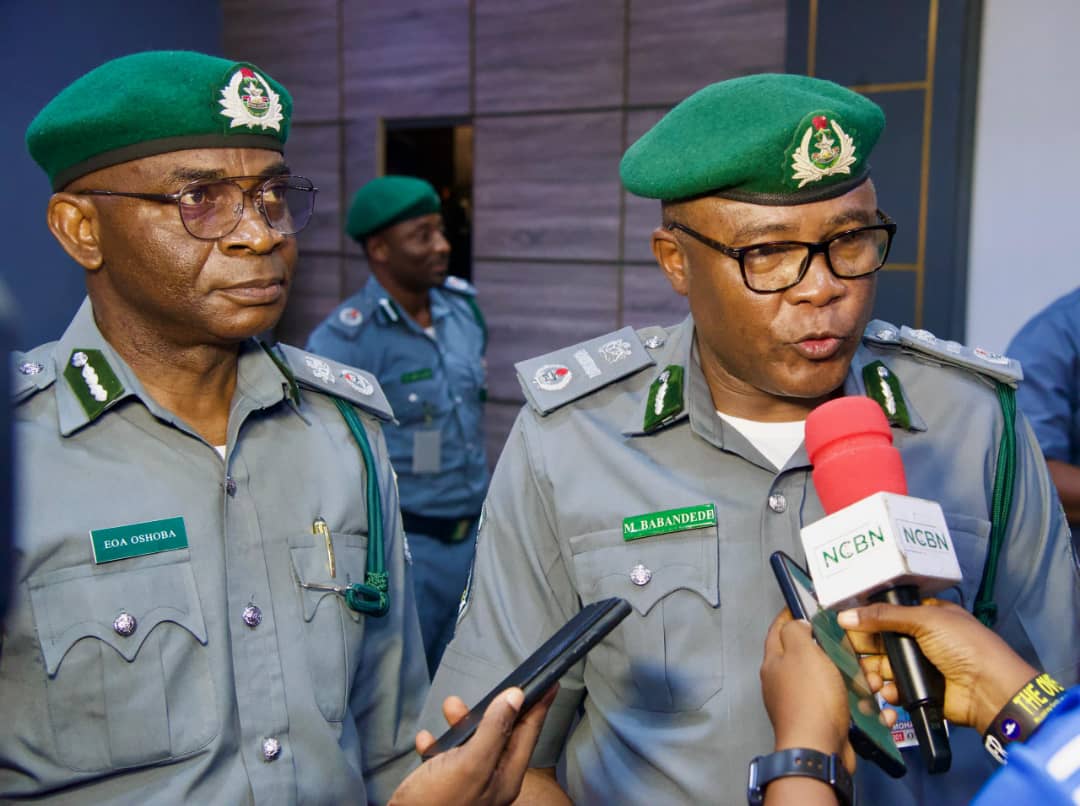
By Izuchukwu Ozoemena
Officers and men of the Apapa Customs Command have received a special commendation for maintaining an exceptional performance in revenue generation, anti-smuggling operations and trade facilitation throughout 2025.
Mohammed Babandede, Assistant Comptroller-General of Customs (ACG) and Zonal Coordinator, Zone ‘A’ of the Nigeria Customs Service handed down the commendation during his familiarization visit to the Command, Thursday.
Chief Superintendent of Customs, Isa Sulaiman, the image maker of the Apapa Customs Command disclosed this in a press release.
Addressing officers and men during the visit, the image maker stated, the Zonal Coordinator explained that the purpose of his coming was to acknowledge the operational challenges faced by the Command, appreciate its notable achievements and further boost the morale of personnel who have consistently surpassed expectations, particularly in revenue collection where the Command exceeded its annual target.
”The ACG also lauded the Command’s sustained anti-smuggling efforts, especially the significant seizures of narcotics and other illicit substances including cocaine and tramadol, describing these interceptions as critical contributions to national security, public health and societal safety. ”
Effective enforcement, the ACG emphasized, remains fundamental to creating a secure environment for legitimate trade to thrive.
While noting that the core responsibilities of the Service extend beyond revenue generation to include national security, public safety and trade facilitation, the Zonal Coordinator commended the Apapa Command for its effective inter-agency collaboration. He urged officers to deepen cooperation with sister agencies, particularly in the deployment and promotion of trade facilitation tools that have positioned the Service at an upper-class operational rating.
The Zonal Coordinator further stressed the importance of integrity, reputational management, mentorship and capacity building within the Command. He urged senior officers to transfer knowledge and experience to younger officers while also drawing attention to the importance of officers’ welfare and health, disclosing that drug tests would be conducted across Commands. He advised officers to remain health-conscious for effective service delivery.
In his remarks, the Customs Area Controller, Apapa Area Command, Comptroller Emmanuel Oshoba, expressed appreciation to the Zonal Coordinator whose February 5 visit was motivating and timely. He reaffirmed the Command’s commitment to sustaining its performance in revenue generation, enforcement, trade facilitation, inter-agency cooperation and ethical conduct in strict adherence to the Nigeria Customs Service Act, 2023 and the policy thrust of the Comptroller-General of Customs, Dr Adewale Adeniyi.
Customs
Freight Forwarders Warn FAAN To Halt New Charges In Airport Cargo Operations or Risk Rumble in the Sector .

By Izuchukwu Ozoemena
If the recent arbitrary increase in charges by the Federal Airports Authority of Nigeria (FAAN) is not reviewed, cargo operations across airports nationwide risk disruption, prompting huge losses in government revenue, airports freight forwarders have warned.
Leaders of major associations operating at the nation’s airports stated this in Lagos, Tuesday. The associations included the National Association of Government Approved Freight Forwarders (NAGAFF), the Association of Nigerian Licensed Customs Agents (ANLCA), African Professionals Freight Forwarders and Logistics of Nigeria (APFFLON) and NAFFAC.
Featuring at the briefing, among others, were Dr. Segun Musa, Deputy National President of NAGAFF in charge of Air and Logistics, and Mr. Tope Akindele, Chairman, Airport Chapter of ANLCA.
Speaking on behalf of the groups, Dr. Musa traced the controversy to an agreement reached with FAAN in 2010 over the collection of a seven-naira-per-kilogram levy on cargo, which, according to him, was tied to the allocation of land for the development of a cargo village at the airport.
He explained that prior to that agreement, FAAN had been collecting two naira per kilogram, a charge the freight forwarders had challenged on the grounds that FAAN, having concessioned cargo operations to companies such as NAHCO and SAHCOL, was not directly provding cargo handling services.
He said the associations had formally written FAAN at the time, arguing that the two-naira charge was illegal, a move that led to prolonged negotiations that reportedly lasted for about two weeks and disrupted activities at the airport. According to him, an eventual compromise was the introduction of the seven-naira charge in exchange for the allocation of land to build a cargo village, a deal he said formed the basis for the current arrangement.
“The seven naira we are talking about is attached to this land. It is like rent on this land,” Musa said, insisting that FAAN had no right to impose fresh charges without first engaging stakeholders. He argued that, just as the Nigerian Ports Authority (NPA) relates with terminal operators after concessioning the seaports, FAAN should deal with its concessionaires rather than directly imposing charges on operators.
The freight forwarders also raised financial concerns, claiming that FAAN had already made substantial sums from the seven-naira levy over the years. Musa said that in 2010 alone, FAAN collected over one billion naira from the charge and that from 2010 to date, the cumulative amount would be far higher than the value of the land allocated for the cargo village.
The immediate trigger for the latest dispute, according to the associations, is FAAN’s decision to increase the existing charges without consultation, a move they said was followed by a threat letter warning of possible demolition of their secretariats. The groups described this as coercive and counterproductive, stressing that they were not opposed to a review of charges but it must be done through dialogue.
Instead of imposing higher fees, they argued, FAAN should work with operators to create an enabling environment that would increase cargo throughput, which in turn raise revenue. “The more cargo we have, the more revenue they generate,” Musa said, adding that the present approach would only hurt all parties involved.
Mr. Tope Akindele, Chairman of ANLCA Airport Chapter, said the ongoing standoff had already begun to affect revenue generation. He noted that cargo activities had slowed in recent days because many operators were staying away from work in protest. According to him, if a concessionaire that used to make about one billion naira weekly is now making roughly half of that, continued disruption could lead to even worse outcomes for government revenue.
He stressed that the associations were not trying to sabotage government earnings, noting that any revenue yet to be paid due to the slowdown would still be collected once normal operations resume. “We want government daily revenue to continue. We are not frustrating government revenue. We are ready to continue paying, but let us dialogue within the shortest time so our job can commence,” he said.
Akindele also argued that globally, increments in charges are usually benchmarked around 25 per cent, adding that this was the standard the associations were willing to consider. Beyond that, he said, stakeholders should jointly explore ways to increase cargo volume rather than rely solely on higher levies.
Other speakers at the briefing raised concerns about what they described as multiple layers of charges on the same cargo. They pointed out that cargo handlers and airlines already collect various fees per kilogram, which are ultimately linked to FAAN, and argued that imposing additional charges on freight forwarders amounts to double or even triple taxation within the same cargo chain.
One of the speakers claimed that aside payments to cargo handlers and airlines, some charges could reach as high as 30 naira per kilogram in certain instances, warning that piling more levies on operators would further increase the cost of doing business and weaken the competitiveness of Nigeria’s air cargo sector.
The associations also recalled that the original dispute over the legality of the levy had not been fully resolved in court, but was set aside in favour of a mutual understanding aimed at keeping the industry running. They warned that if FAAN proceeds unilaterally or attempts to formalise the new charges without broad stakeholder agreement, the matter could return to the courts.
The freight forwarders called on the Minister of Aviation to intervene and prevail on FAAN to open talks with stakeholders. They stressed that they were not protesting, not carrying placards, and not seeking confrontation, but were instead asking for engagement that would lead to a mutually beneficial resolution.
They warned that if cargo operations at airports across the country were to grind to a halt, the wider economy would suffer, describing such a scenario as a “lose-lose” situation for operators and government alike. Despite the tension, they said they had advised members nationwide to continue working and avoid actions that could escalate the situation.
The associations assured the Federal Government that once negotiations begin, normal operations would resume immediately, with the existing status quo maintained pending the outcome of discussions. They also reiterated their willingness to work with FAAN and other government agencies to grow cargo volumes and, by extension, government revenue.
“We are here to appeal. We are not here to threaten or to protest or to cause a breakdown of law and order,” Musa said. He added that most operators depend on daily airport activities to feed their families and sustain their businesses.
-

 Customs3 weeks ago
Customs3 weeks agoKLT Customs Surpasses 2025 Revenue Target By a Wide Margin, Clamps Down on Expired Imports.
-

 Customs1 week ago
Customs1 week agoFreight Forwarders Warn FAAN To Halt New Charges In Airport Cargo Operations or Risk Rumble in the Sector .
-

 Maritime Agencies3 weeks ago
Maritime Agencies3 weeks agoOGUN AREA 1 CUSTOMS: Suspected Armed Drug Traffickers Mount Barricades, Attack Officers. Two Personnel Critically Injured.
-
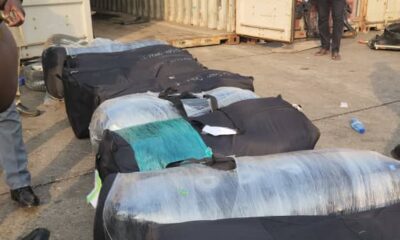
 Maritime Agencies2 weeks ago
Maritime Agencies2 weeks agoWAR AGAINST KILLER DRUGS: Apapa Customs, NDLEA Collaborate To Nab Huge Quantity of ‘Canadian Loud’.
-

 Customs2 weeks ago
Customs2 weeks agoLekki Deepsea Port: The Success Story of the Nigerian Ports Authority.
-
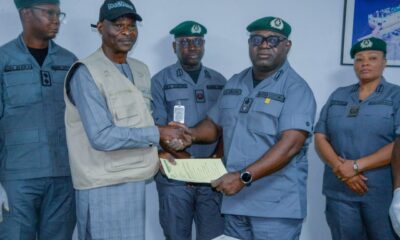
 Customs2 weeks ago
Customs2 weeks agoPTML Customs Hands Over Seized Arms and Ammunition, Collects N44.06bn in January.
-
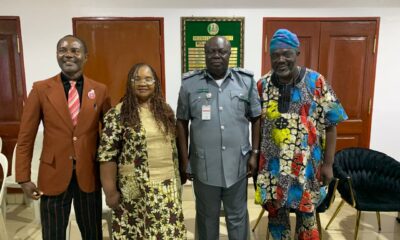
 Maritime Agencies2 weeks ago
Maritime Agencies2 weeks agoSeme Customs Raids Hideouts, Impounds 200 Bags of Smuggled Rice, Collects N2bn 3 Weeks into 2026.
-
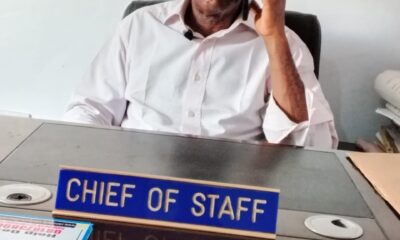
 Maritime Agencies2 weeks ago
Maritime Agencies2 weeks agoNAGAFF Compliance Team Set to Relaunch for Stronger Engagement, Enforcement.


